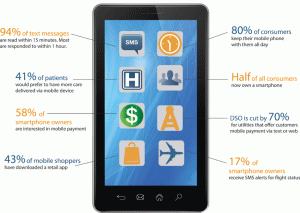 4 in 5 health consumers expect doctors not only to treat them when they’re sick, but to keep them healthy. “In sickness and in health” now morphs over to the doctor-patient relationship, beyond the marriage vow.
4 in 5 health consumers expect doctors not only to treat them when they’re sick, but to keep them healthy. “In sickness and in health” now morphs over to the doctor-patient relationship, beyond the marriage vow.
Better Health through Better Patient Communications, a survey from Varolii, finds that people are looking for health, beyond health care, from their physicians. Varolii is a customer interaction company that claims to have interacted with 1 in 3 Americans through some sort of company communication: they work with major Fortune 1000 companies, including banks, airlines, retail, and, yes, health care. They recently attracted a talented Expedia pro to join their team.
One-half of people believe that a message (whether via email, text or smartphone app) could have helped them avoid a health problem. 55% of consumers said they often leave a doctor’s appointment wishing they had more information and attention for follow-up.
Specifically, 80% of people say a reminder from their doctor to help them stay on treatment plans would be helpful. 67% of consumers like the idea of receiving tips and reminders for diet and exercise.
The most desired formats for reminders would be email, cited by 38% of consumers; text messages, for 16%, paper postcards, for 15%; and, smartphone apps, cited by 14% of health consumers.
Thus, one size won’t fit all health consumers when it comes to communication.
Varolii conducted the survey in August 2012, among 1,001 U.S. adults.
Health Populi’s Hot Points: Health care is late to the customer service game, especially when the noun “customer” is the patient. While health care suppliers have mastered business-to-business sales processes — think drug companies with well-honed sales forces and insurance company fine-tuned sales strategies to large employers — serving the health end-user — the patient, consumer, caregiver has gotten short-shrift
Companies like Varolii, who understand how to reach out and touch consumers using financial services, travel, and shopping, are translating the lessons learned in those market segments to health care
How will physicians fare in this environment? In this case, it will take not a village but a health care team for the physician to be able to deliver on the customer service promise. Incentives are certainly aligning to drive doctors toward this consumer-centric vision. Some doctors will feel compelled to join larger practices or hospital systems to scale their ability to provide this level of customer service. At the other end of the spectrum, technology can also help the very small “micro-practice” that seeks to deliver a high level of service, whether concierge or specialty solo practice. Regardless of the model, doctors who deliver on the promise of customer service will gain the allegiance of their patients — and improve their health outcomes in the process.




 Interviewed live on BNN Bloomberg (Canada) on the market for GLP-1 drugs for weight loss and their impact on both the health care system and consumer goods and services -- notably, food, nutrition, retail health, gyms, and other sectors.
Interviewed live on BNN Bloomberg (Canada) on the market for GLP-1 drugs for weight loss and their impact on both the health care system and consumer goods and services -- notably, food, nutrition, retail health, gyms, and other sectors. Thank you, Feedspot, for
Thank you, Feedspot, for  As you may know, I have been splitting work- and living-time between the U.S. and the E.U., most recently living in and working from Brussels. In the month of September 2024, I'll be splitting time between London and other parts of the U.K., and Italy where I'll be working with clients on consumer health, self-care and home care focused on food-as-medicine, digital health, business and scenario planning for the future...
As you may know, I have been splitting work- and living-time between the U.S. and the E.U., most recently living in and working from Brussels. In the month of September 2024, I'll be splitting time between London and other parts of the U.K., and Italy where I'll be working with clients on consumer health, self-care and home care focused on food-as-medicine, digital health, business and scenario planning for the future...